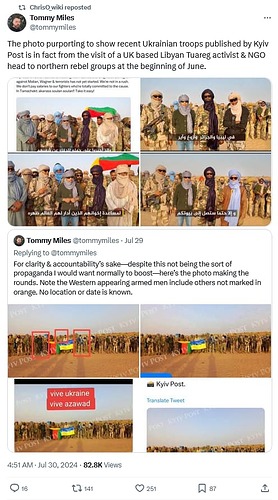Most EDM DJs only care about money. Very often they come from privileged backgrounds themselves. They regularly play crappy venues like Dubai. If there was a paying gig to entertain the jet setting kids of the Reich, most wouldn’t hesitate to play it.
Only a couple of names in there. One was Atom TM which is one of the aliases of Uwe Schmidt who has appeared on music threads here under his Señor Coconut alias. I have various records by him under various names and with a few different people but I doubt anything in the last 20 years. Hadn’t heard of him in a long time. Maybe he needs the cash if he’s DJing at some Russian mainstream festival. That he is headlining apparently (I didn’t go to the festival site as I don’t read any Russian at all) speaks volumes about how many refusals they must have had.
ETA
Checked the website and he is second billing one of the nights to Esplendor Geométrico who I don’t know but I wouldn’t really know Spanish industrial music. Couple of other ones on the list are Berlin based but may be Russian or Russian (imperial) diaspora. You know the way when you meet someone from, say, Moldova and they may be Russian.
The Kremlin does not disapprove of techno.
According to the festival’s website, Outline’s official partners are T-Bank and Yandex, two leading Russian companies that were once independent but have recently come under Kremlin influence. Meanwhile, the pro-Kremlin outlet Lenta serves as the festival’s official media partner. Last year, a military recruitment tent was set up near the entrance to the festival.
I’m sure they were laughed at by the trashy sons of oligarchs and their courtiers. Or maybe the tent was set up as a convenient way to accept bribes.
In any case it means that foreign DJs talking about peace and love are bullshitting themselves.
Over a year and a half ago, I wrote multiple posts and threads about the persistence of Soviet-style command within the Ukrainian army. At that time, many dismissed my concerns, arguing that war is not the time for change, or outright attacked me for criticism. Unfortunately, the situation has only worsened since then, and the problem remains systemic. This issue existed before General Zaluzhnyi, continued during his tenure, and has deteriorated further under General Syrskyi. Despite promises to improve the situation, Syrskyi has increased authoritative pressure on commanding officers to hold ground with the same limited resources, and the results are evident.
Earlier this year, I correctly noted with my team that the Kharkiv operation was likely a diversion and that the main focus would remain on Donbas. While our troops have been trying to retake Hlyboke and have spent months holding the Krynki foothold (despite unclear objectives given our limited resources), Russians have systematically exhausted our brigades in Donbas. The Russian approach is not particularly innovative: they send small tactical units against Ukrainian defenses daily until one position falls, then exploit the success. Senior Ukrainian commanders have attempted to adopt similar tactics, forgetting that we have far fewer people and unreliable Western support that may or may not arrive on time, if at all.
Is it better on the Russian side? Absolutely not. My team has recordings of multiple radio communications from the Russian side, revealing threats of execution or denial of medical evacuation if their troops refuse to advance. It is far worse for the Russians, but they have significant advantages in personnel, equipment, vehicles, artillery, and air force. They can afford such tactics—we cannot. Moreover, the Russian army in 2024 is much smarter and more experienced than the disorganized troops we saw in February 2022. The only way to halt their advancement is to outsmart them by being more resourceful and careful, aiming to preserve our personnel when the situation requires it.
It is still possible to break the spine of the Russian army, which has severe logistical problems, dwindling availability of preserved vehicles, reliance on unarmored transportation, unmotivated personnel, and artillery barrel replacement bottlenecks. Additionally, many internal economic problems take time to manifest.
However, the window of opportunity is getting smaller. Unless radical changes are made, we are heading toward the most unfavorable scenario of all: forced negotiations, stalemate, minimization of Western aid, re-armament of the Russian army, and a new round of the war with much more unfavorable outcomes for Ukraine, leading to occupation and forced assimilation.








